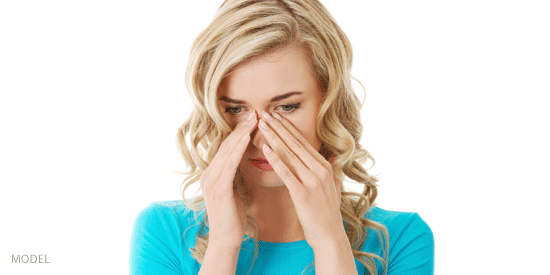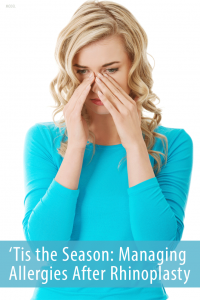‘Tis the season for spring flowers, green grass, and warm, beautiful weather! However, along with spring, unfortunately, comes allergy season. Runny noses, sneezing, and watery eyes are commonplace this time of year, and while they are usually merely annoying, they can be especially troublesome for rhinoplasty patients in Chicago.
If you’re considering rhinoplasty surgery before the summer months and you tend to experience allergy symptoms, I encourage you to think about managing both seasonal allergies and a healing nose. In this blog post, I’m sharing 3 important tips. Consider these points as a guide for conversations with your plastic surgeon and a rough checklist to help you prepare.
1. Talk to your doctor about your allergy conditions.
When patients come to my Chicago office for rhinoplasty consultations, I ask about their allergy histories, any medications they use to manage allergies, and the places or seasons in which they experience their worst symptoms. Decongestants or steroids can help minimize these symptoms. In some cases, the use of such medications can interfere with rhinoplasty surgery or the healing process. Therefore, it may be wise to consider scheduling your rhinoplasty at a time when your allergy symptoms are less severe to avoid any issues altogether.
In most cases for my patients with allergies, there is a solution that won’t significantly affect their rhinoplasty plans or results. It simply takes an open discussion to determine what special steps should be taken.
2. Be prepared.
After you receive approval from your surgeon to move forward with the procedure, you should begin to prepare everything you’ll need. Purchase the approved allergy medication and, if necessary, begin to take it regularly before your surgery so that it becomes established in your system. If you think you may have an allergy flare-up during your recovery, you’ll want to be ready with pre-approved medication. Consider all of the possibilities, and make sure you’re ready and your surgeon is well informed of your plans.
I also advise my patients not to blow their noses for a day following rhinoplasty, and then gently, until the first follow-up appointment. However, instructions are individualized depending on whether I am treating the turbinates (frequently enlarged in patients with allergies), and how much work I do on the septum.
To prepare, you should purchase extra soft tissues and cotton balls, and any other items necessary for your recovery. Buy extra of each, just in case allergies do flare up. You’re going to be swollen and may have some pain and discomfort for the first few days after your surgery. If allergies hit, this may become intensified. Occasionally, I will give patients a short course of steroids postoperatively which greatly reduce the allergy symptoms during the early post-op recovery. We’ll discuss all of the items you’ll need during your consultation, but I also encourage you to visit my blog post, Your Rhinoplasty Preparation Timeline, for more detailed tips.
3. Schedule accordingly.
Undergoing rhinoplasty at the same time as allergy season can exacerbate the intensity of allergies and cause even greater discomfort. If you have any outdoor excursions planned immediately before or shortly after your surgery that could induce a flare-up, you should consider rescheduling those events. Then again, finding the right combination of allergy medication may be all that is needed to prepare for your surgery.
Here’s a little bonus bit of information: Some of my rhinoplasty patients ask whether the surgery might improve their allergy symptoms by making breathing easier. The answer is yes and no. Rhinoplasty can certainly improve breathing by correcting a deviated septum or enlarged turbinates, for example, but it won’t actually affect your body’s reaction to allergens. You’ll still have allergies, but they may be a bit easier to tolerate.
As this post is only a guide for managing your allergies after surgery, you may want to learn more about the procedure in other blog posts that I’ve written. You can find those under the rhinoplasty category of my blog. Remember that your surgeon will be able to guide your decisions related to your rhinoplasty best, so rely on him or her for more detailed information and suggestions.
And if you’re currently looking in Chicago for a rhinoplasty specialist, you can contact us using the online form to request a consultation or call my office at (312) 788-2560 to schedule an appointment.



Leave a Reply